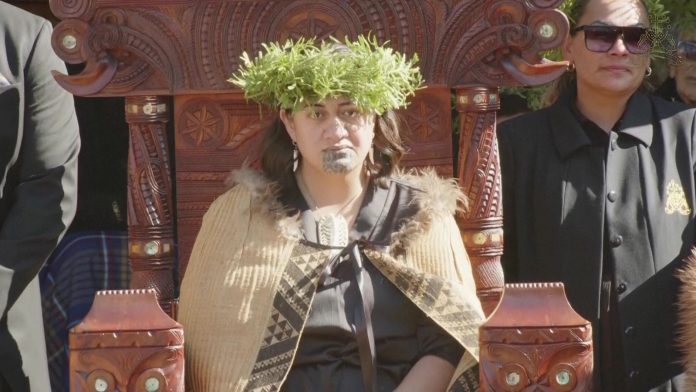The Bishop of the Anglican Church of Maori, the Most Revd Don Tamihere, who is one of three Anglican Church Archbishops in Aotearoa, New Zealand and Polynesia, has anointed the newly elected Maori Queen, Te Arikinui (paramount chief) Kuini (Queen) Nga Wai Hono i te Po, New Zealand media reported.
The monarchy, which is inherited from the paramount chief of a major tribe in the central North Island, is for Maori tribes who recognise that leadership.
Thousands of people attended an enthronement and thanksgiving service earlier this month during which Maori church leaders gave prayers, readings and blessings, the Anglican church said on its website last week. Among those invited were representatives from the Anglican, Methodist, Presbyterian and Ratan churches, as well as the Salvation Army.
Tumuaki (summiter of destinies) Kiingitanga (Maori movement for king) Hone Taamihana crowned the queen, holding a Bible above her head while saying prayers. The Bible was used in 1858 for the coronation of the first Maori king. Archbishop Tamihere then anointed her with sacred oils.
She succeeded her father, the late Kiingi Tuheitia Potatau Te Wherowhero VII, who died late last month. Immediately after her enthronement, the Queen boarded a traditional ceremonial canoe (waka) to escort his body to his final burial site downriver from Turangawaewae Marae at Mount Taupiri.
Speaking afterwards, Archbishop Tamihere said:
“She is humble and wise beyond her years. She has her people and all of her ancestors behind her. May God bless her reign as she seeks to lead her people to kotahitanga [unity].”
In his sermon, he said:
“We cannot build our kotahitanga on bitterness and resentment. We cannot build our kotahitanga on the steeping of racism in this country…The only way that we can build kotahitanga amongst us is to shift ourselves to a politic of love…The love that I speak of is a love that must transcend the temporary, must transcend the hurt and the harm that has come our way, must become something that will last us a lifetime, and, something even more enduring than that, this must be a love that is eternal.”
Archbishop Tamihere was the main author of a letter signed by more than 300 Christians asking the New Zealand government not to take the Treaty Principles Bill any further. The bill, introduced by ACT, the libertarian partner of the national coalition government, argues that the government has the right to govern all New Zealanders.
The letter says:
“The proposed Bill is inconsistent with Te Tiriti o Waitangi [The Treaty of Waitangi] in that it does not recognise the collective rights of iwi Maori [the Maori people] or guarantee their relationship with the Crown. It would undermine what Te Tiriti guarantees, and what decades of law, jurisprudence, and policy have sought to recognise. We note with deep concern the harmful impacts the Bill may cause to Aotearoa New Zealand’s social cohesion.”
The Maori are the indigenous and main population of the country before the arrival of Europeans. They now number around 600,000 in New Zealand, according to the 2013 census, accounting for 15 per cent of the country’s population. About 155 thousand Maori live in Australia and about 3.5 thousand in the US. Maori also live in the Cook Islands near New Zealand, where they make up 87.7 per cent of the population.
The Maori are famous for their militancy and independent temperament, they fought long and hard against the colonisers. At the beginning of the XIX century they were about 100 thousand people, and by the beginning of the XX century their number decreased to 40 per cent of the “pre-contact” level – not so much because of the wars, but because of the diseases introduced by Europeans, to which the Maori were not immune.
At the same time, there was a huge influx of European settlers, supported by the colonial authorities, with the British paid for by the government. As a result, in 1896 the number of Maori in New Zealand was only about 42 thousand people, and the European population of about 700 thousand. This disparity remains to this day.
